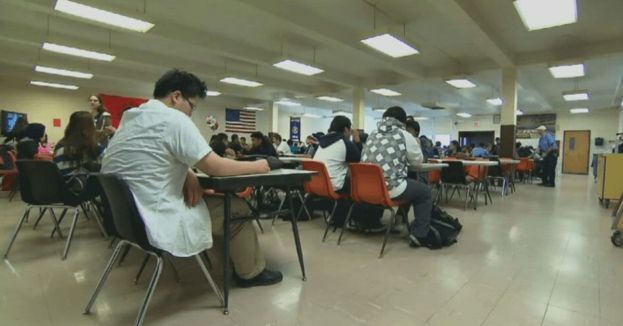Advocates of the move also believe it will provide spiritual care to students who are unable to afford or access religious schools.
Conservatives argue that the introduction of religious foundations in public schools will serve as a "rescue mission" for what they perceive as declining values in these institutions. This issue has sparked a battle in Republican-controlled Legislatures over matters such as parental oversight of curriculum, restrictions on books, instruction on gender identity, and state-funded tuition assistance for private and religious schools.
However, the chaplaincy campaign has been met with opposition from numerous chaplains and interfaith organizations. They argue that the motivation behind the campaign is offensive and warn of the potential dangers of introducing an authoritative figure to children without clear standards or boundaries.
WATCH: WE NEED MORE DAD'S LIKE THIS![]()
"They are going to be engaging students, sometimes when they’re at their most vulnerable, and there’s not going to be any checks on whether they’re able to proselytize, what they’re able to say to kids grappling with really difficult issues," expressed Maureen O’Leary, organizing director at Interfaith Alliance. The organization has voiced its concerns to lawmakers and school boards, advocating for schools to be "neutral spaces where students can come as their full selves," according to O'Leary.
INTERESTING WATCH: RFK TALKING TO GLENN BECK ON WORLD ECONOMIC FORUM![]()
April 02, 2024
In 2023, Texas became the first state to permit school chaplains under a new law. The National School Chaplain Association (NSCA), a Christian chaplain ministry, claims it played a pivotal role in the passage of the Texas law. The NSCA is a subsidiary of Mission Generation, a group established in 1999 with the goal of bringing Jesus to classrooms worldwide. In a December 2023 newsletter, the NSCA lauded Texas for initiating a "national movement placing God back in public education."
UNIVERSITIES HAVE LOST THEIR WAY, ARE THEY THE ROOT OF THE PROBLEM?![]()
The NSCA asserts that its chaplains "deliver holistic care, guidance, and safety to all people, all the time regardless of their personal beliefs, or non-beliefs." However, after the bill was passed, a group of Texas chaplains from various faiths and denominations collectively wrote to school boards, warning that the law does not mandate that "chaplains refrain from proselytizing while at schools or that they serve students from different religious backgrounds."
WILL HARVEY WEINSTEIN'S RETRIAL ACTUALLY EVER HAPPEN?![]()
The law required over 1,200 school districts to decide by March 1 whether they would allow chaplains as employees or volunteers. Many of the largest districts opted out. Houston and Austin stated that the roles and responsibilities of volunteers remained unchanged, meaning a volunteer would not be providing chaplain services. Dallas’ school board declared that chaplains should not be employees or volunteers at this time.
Meanwhile, school chaplain bills have been introduced in several Southern and Midwestern states, with varying degrees of success. A school chaplain bill passed both chambers of the Florida Legislature and is awaiting Gov. Ron DeSantis's signature. The bill stipulates that school policy must describe the services of a volunteer chaplain and require parental consent.
NETANYAHU'S WORST NIGHTMARE? THE ICC'S POTENTIAL DECISION COULD ROCK ISRAEL'S LEADERSHIP![]()
In Utah, Rep. Keven Stratton argued that recent Supreme Court decisions on religious freedom provide an opportunity for school chaplains and a return to the tradition of acknowledging God in public institutions. However, his counterpart in the Utah Senate, John Johnson, observed an "outright disdain for religious principles within our schools" during committee meetings. He warned that this could lead to more families choosing alternatives to public school.
RUSSIA'S AERIAL ASSAULTS MET WITH UKRAINE'S DRONE RESPONSE![]()
"It would be helpful and much easier if my colleagues would take our efforts here not as an attack but as a rescue mission," Johnson stated on the Senate floor.
Efforts to blur the line between church and public schools have been on the rise, from proposals by then-President Donald Trump to state governing bodies. Civil liberties groups argue that this undermines the equal treatment of all faiths and threatens religious minorities.
WATCH: GREEN PARTY'S JILL STEIN LANDS IN JAIL AFTER DRAMATIC CLASH WITH POLICE![]()
Public schools have been prohibited from leading students in classroom prayer since 1962, following a Supreme Court ruling that it violated the First Amendment clause forbidding the establishment of a government religion.
The modern role of chaplains, traditionally a clergyperson ministering outside of a congregation, is "very gray," according to Wendy Cadge, director of the Chaplaincy Innovation Lab at Brandeis University in Massachusetts. She explained that it's not uniform or universally understood.
FROM HOLLYWOOD TO HOLY WATER: THIS SUPERSTAR DETAILS HIS JOURNEY TO CHRISTIANITY![]()
Chaplains serve in various capacities in the U.S., including in Congress, the military, and correctional facilities, each with rigorous requirements for hiring and service. Hospitals, police and fire departments, colleges, and private companies also hire chaplains with wide-ranging standards.
SENATOR VANCE'S GIVES EYE-OPENING CRITIQUE OF BIDEN'S ISRAEL POLICY![]()
Many chaplains have seminary or ministry training in and the endorsement of a particular faith. However, chaplains serving in multicultural places may also be required to undergo professional, supervised training called clinical pastoral education. This training helps chaplains learn how to serve untethered to their faith so "transference or reactivity doesn’t get in the way of really attending to people’s needs," according to Eric Johnson, director of spiritual care at UnityPoint Health’s Des Moines-area hospitals.








 Discover alternative ideas that will make you think
Discover alternative ideas that will make you think Engage in mind bending debate
Engage in mind bending debate Earn points, rise in rank, have fun
Earn points, rise in rank, have fun


